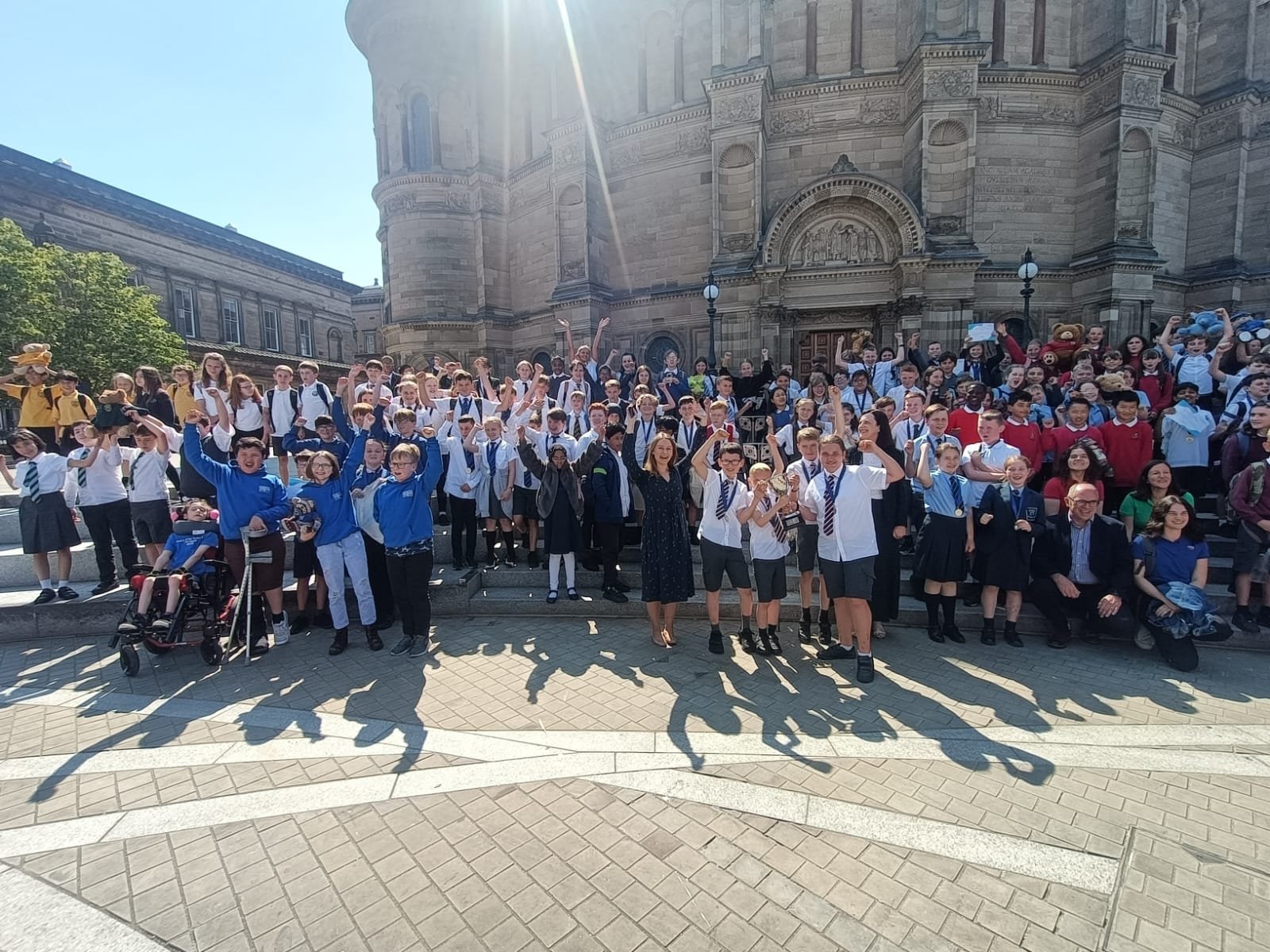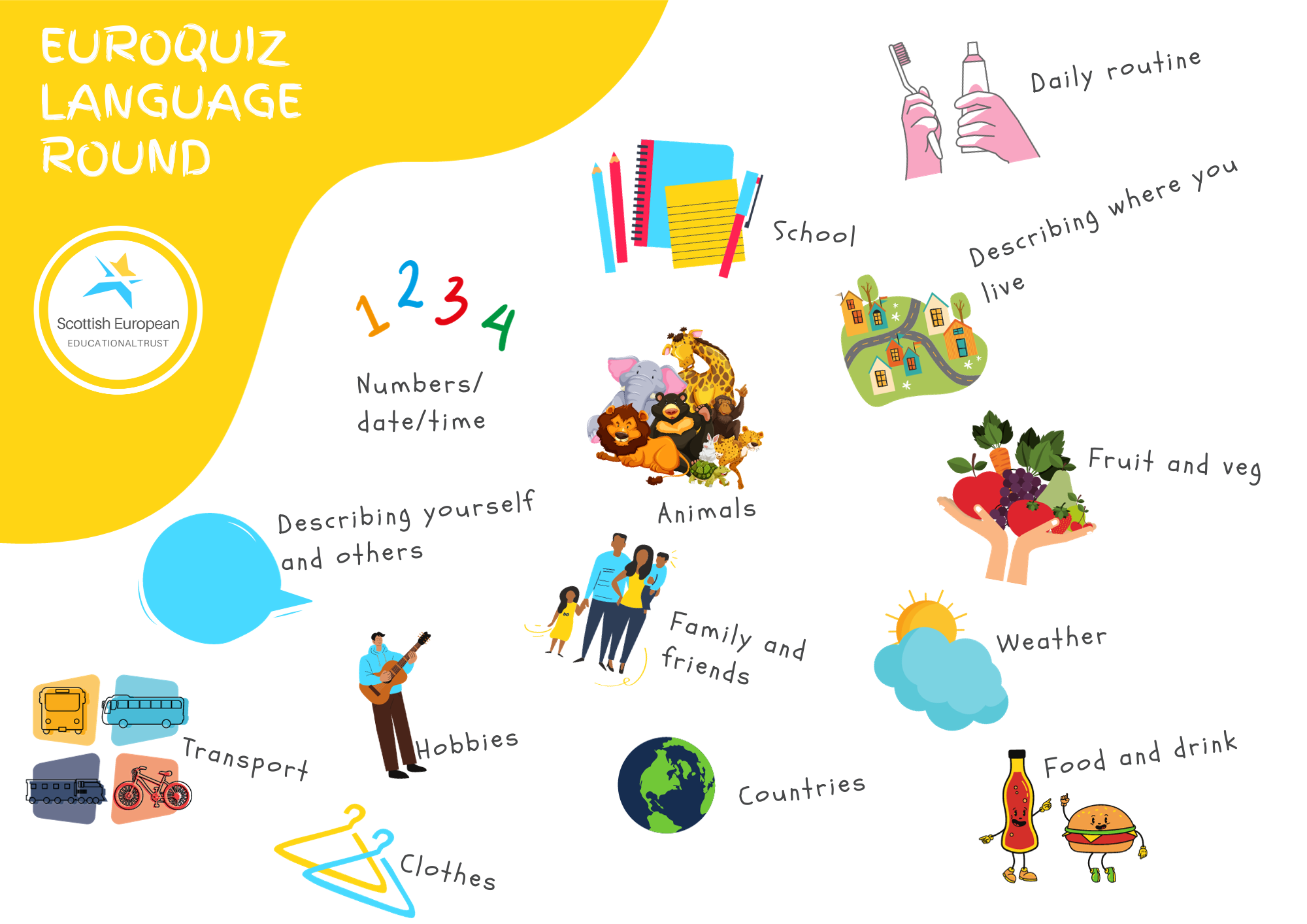Information for Schools
Euroquiz is an annual project open to all P6 pupils across Scotland, which sees teams of four working together to broaden their knowledge of Europe and the wider world. Subjects covered include languages, history, geography, culture and European affairs. Heats take place in local authorities from February to April, with the winning teams from all areas progressing to the National Euroquiz Final in June.
Euroquiz creates an enthusiasm for learning, developing pupils' ability to work in teams and communicate effectively, ultimately increasing their confidence and range of core skills. Euroquiz is run by the Scottish European Educational Trust (SEET) and Heats are organised in collaboration with each Local Authority area. SEET works alongside Local Authorities and schools by providing teachers with the guidance and resources to support the development of confident language learners under 1+2 and outward looking engaged citizens through LfS.
How to Enter
Each school may enter one team of four contestants. Substitutes may attend the heat but will only be allowed to take part if one of the team members has to withdraw.
- To enter your team, please complete the Registration Form for schools and return to your local authority Euroquiz organiser. All schools in Scotland will receive this information directly from their local authority organiser. If you have not received a form, or do not know who your local organiser is, please get in touch with SEET: jane@seet.org.uk
- There will be no charge for entering Euroquiz.
- Teachers will be required to help with marking during the heat.
Preparing Your Team
Resources are all available to access for free online and can also be downloaded.
- Past papers and sample questions are available on the Euroquiz Resources tab of this website to help prepare your team.
- The majority of the questions in the heats will be taken from the materials and recommended websites listed on the Resources Page, which can be accessed here.
- During the Heat, questions will be presented on PowerPoint or YouTube, and pupils will be asked to write down their team answers.
- If your Heat is an in-person event, please make sure that pupils have permission for photographs. If there are any pupils who do not have permission, please inform the quiz organiser in advance of the heat.
- We encourage Euroquiz clubs to take place in schools to allow past participants to work alongside younger learners. This enables learners to participate in or lead on the Euroquiz project through curricular or extra-curricular activities – for example, peer or cross-phase learning. Having a whole school approach is also important in recognising the achievement of pupils taking part.
The Euroquiz Heat – What to Expect
All questions in the Heats are to be answered by the team collectively. They may wish to nominate one member to write down the answers.
We will continue to ensure that Euroquiz is accessible for all who wish to take part and will offer models for both online and in-person heats in 2024. SEET will work with each Local Authority to provide a Euroquiz format and platform that works well for schools.
Round 1: Geography & History (15 questions)
Questions may include topics such as flags, borders, geographical features, landmarks, notable historical events and people.
Round 2: Languages (15 questions)
The questions in the language round will feature German, Spanish, Italian and French. These will be 10 listening comprehension questions. These will be shown in video format. There will also be a short reading comprehension text followed by 5 questions.
Please find further Euroquiz 2023-24 Heats language guidance here
Language questions are drawn up together with 1+2 Development Officers, Education Scotland and SCILT (Scotland’s National Centre for Languages) to support the development of language learning in primary schools. Materials will be recorded by native speakers.
Round 3: Understanding Europe: Culture and European Affairs (15 questions)
These questions may include the names of important people and places, basic information about political representation and significant events. Culture questions may include art, gastronomy, traditions, music and will also give pupils an opportunity to learn about similarities and differences between different countries.
Round 4: General Knowledge (15 questions)
These questions will include a compilation of topics from other rounds. More general topics may feature here, including sport, science, currencies and travel.
All scores from Rounds 1-4 will be used to identify a winning team and runner up. The winning team will be invited to attend the final in Edinburgh (if events are possible at this stage). Each participant will receive a certificate. Tiebreakers will be available if necessary.
Statement regarding age ranges of Euroquiz pupils:
Euroquiz is a project designed for P6 learners in schools across Scotland. However, in very few cases, some smaller schools do not have enough children at P6 to make a team of four. In these circumstances, SEET may allow a mixed age team, providing that the majority of the team is comprised of children at P6 or younger: for example, a team consisting of two children at P6, one at P5 and one at P7. Such cases will be approved on a case-by-case basis on submission of a detailed rationale. We would like to remind everyone that this will be considered only in exceptional circumstances.
Statement regarding claiming travel expenses
As a very small charity operating in an increasingly competitive funding environment, we must allocate our limited resources thoughtfully to ensure the sustainability of our projects. We regret to inform schools participating in both Euroquiz and Our World events that, due to current financial limitations, we have been forced to significantly reduce our travel budget meant to support schools from areas of socio-economic disadvantage and rural areas to access our project events. As a result, we have produced a travel fundraising toolkit for schools. We may be able to offer partial support with travel to project events in extreme cases, although any school wishing to receive financial support from SEET will need to apply by, emailing it to info@seet.org.uk, and the request will be dealt with on a case-by-case basis. We remain fully committed to finding alternative ways to support and engage with our beneficiaries, and we appreciate your understanding and continued support during this challenging time.










